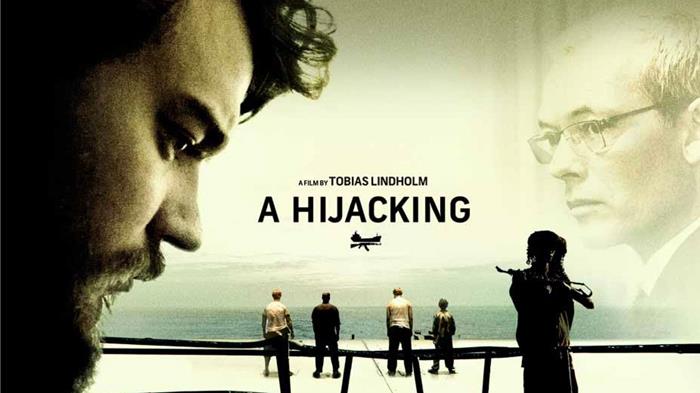Lance St. Laurent’s review of A Hijacking, which was directed by Tobias Lindholm in 2012, was published in Film Matters issue 4.3 in the fall of 2013. He is a freelance critic from Alma, AR. He is currently pursuing a Master’s degree in critical studies at the University of Southern California. His areas of study include contemporary comedy auteurism and the history of the New Hollywood.
Brianna Okamoto: In your article you said that the “audience is left ignorant to the actions of the hijackers”; how do you think that affects the film style?
Lance St. Laurent: The film maintains a very handheld, vérité sort of style about it, which really heightens the tension and sense of immediacy throughout. It’s a style firmly rooted in the point of view of the protagonists both on the boat and in the board room. The advantage of this is a strong feeling of authenticity and emotional rawness to the film. The troubling downside, though, is that it renders the hijackers themselves as this hostile, faceless “other” in the film.
BO: Does suspense define this film for you, or something else?
LS: Suspense in and of itself is a viscerally captivating but fundamentally hollow pursuit. Hitchcock may be colloquially known as the master of suspense, but his mastery of the genre came from a disciplined understanding of character and narrative along with the injection of, at the time, revolutionary notions of the psyche and psychoanalysis. Here, Lindholm’s use of suspense is in service of telling a compelling human drama of survival on one end and an equally compelling story of the collision between the legitimate business world and the life-and-death world of the criminal underbelly. Both stories are fundamentally rooted in the struggle of the protagonists, and our investment is the only reason the suspense registers as strongly as it does in the film.
BO: What are the defining features of Asbaek, who plays Mikkel Hartmann, the lead protagonist and cook onboard the hijacked ship, that make him have a commanding and devastating performance?
LS: It’s a completely unpretentious and raw lead performance. There’s very little in the way of what one might call formal technique to it. It’s a great performance because it feels true and it feels true because Asbaek leaves nothing on the table. In the moment, you are fully convinced that he and his fellow shipmates are balancing on the edge of life and death at any given moment.
BO: Does the audience have faith in Asbaek or do they question his integrity or authenticity?
LS: I feel like the situation in A Hijacking sort of supersedes questions of intention and integrity. Survival is the primary objective, and it’s 100 percent clear that the goal is sincere. It’s not the actions of Asbaek that advance the suspense, but the unpredictable reactions of the hijackers, which gets back to the essence of the first question.
BO: Would it have been possible for the actors to have achieved such realism in their performances without Lindholm terrorizing them on and off screen?
LS: Well, the issue with that question is that whatever answer I give will be speculative, especially because I’m rather unfamiliar with the cast of A Hijacking. There are a couple schools of thought about actors. There are a great number of directors that believe that 90 percent of directing is casting, that talented actors left to their own devices will give voice to the material. This is the sort of thing you hear about a guy like Woody Allen. Then you have your others, your Von Triers, your Hitchcocks, your Herzogs, your Kubricks. These are the kind of guys that command the set to the point of emotional abuse. There’s a cult of personality around directors like this; they’re fun to read about and study. But, there’s no
way to say for sure that the film would be better or worse under different circumstances. Would Lindholm have gotten equally high-caliber performances without putting his actors through the wringer physically? Maybe, but such a change may have also changed the essential nature of the film as a whole.
BO: If you were placed into the same situation as the seamen, what would you negotiate with to save your life?
LS: Thankfully my work as a critic does not put me into such situations often. I consider myself to be pretty cowardly; I’m not the type to put my life on the line to potentially save the lives of my fellow shipmates. That being said, I think part of the reason the film was so effective to me was the pragmatism of the men on the ship and in the negotiations. These guys are flawed, frightened human beings fighting for their existence. Unlike something like Captain Phillips (which was released soon after A Hijacking), there was no attempt to lionize these guys as anything beyond survivors.
Author Biography
Brianna Okamoto is an editorial board member for Film Matters magazine from Raleigh, NC. She is currently pursuing an undergraduate film studies degree from the University of North Carolina Wilmington. Her academic interests have been focused on directing and producing documentary films, as well as the critical studies of censorship in the film industry worldwide.








































